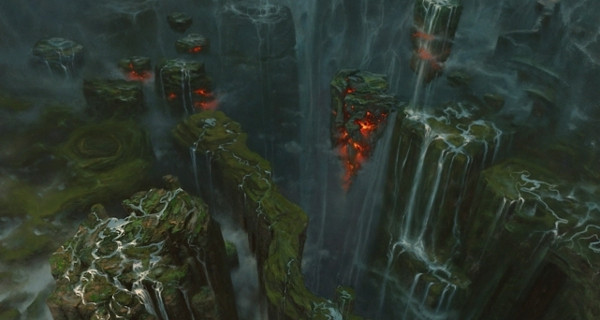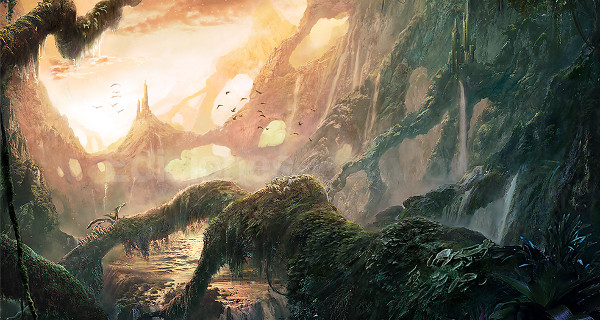Yesterday I posted an old blog entry if you noticed, dated more than one year back. My ideas about sorcery have not changed much fundamentally, but they evolved a bit.
Today I'd like to talk about raw magic, the kind of magic that I'd like to see Sorcerers literally wield.
Types of magic: premises and disclaimers
Ok, so if you're here, you probably know that in D&D there's always been this great divide between Arcane magic and Divine magic. Psionic are considered "non-magic" traditionally, or simply another "power source" in more recent times. Always more recently, with 4th edition, we have become accustomed to distinguish also Primal and Shadow magic, and on a smaller scale even Elemental magic, although it never became a "stand-alone" power source (and the same can be said of Shadow).
Strangely enough, I think this latter power sources, with their murky boundaries and association to other power sources, are a good thing for the game, not mechanically speaking of course since mechanics don't touch power sources, but story-wise. Because it reminds players and DMs alike (if they're a bit open minded), that magic is vast and varied, and that it's not a symmetric and perfect system. This allows for magic to stay a bit more mysterious and... Magic.
This is just a premise for what I will say, and I started it with "strangely enough", because what I will do is actually a bit of a classification of what I think constitutes "The Arcane", something that could give the impression of me trying to over-classify, so I wanted a disclaimer stating that even if I want to try a new classification, first and foremost I want magic, and in particular Arcane magic to stay mysterious/blurry (the "arcane" word coming from Latin "arcanum", meaning "hidden"...)
The Arcane
So, first of all, I'd like Arcane magic, or better yet a general "the Arcane", to have a broader spectrum.
Since 3rd edition, it included sometimes vastly different forms, such as the Warlock's invocations. If you speak a bit of 3rd edition, you surely remember how "spell", "spell-like ability", and "supernatural ability" were quite different things in the rules, although all of them could have dealt with Arcane magic. In a way, I'd like a return of those distinctions, but much more within the lore than within the rules. Rules-wise, it should always be left to DMs to decide how much to complicate the game, but flavor-wise, sometimes it's better to mention stuff that could turn out useless, than not mention it and make (some) games poorer because they didn't have the right inspirations.
Where am I getting at? Well, I'd like to split the Arcane quite a bit.
A Sorcerer or Warlock casting the same spells of a Wizard will rightly call for cries of "Sorcerers/Warlocks should be Wizard subclasses". And as I explained in the previous post, this is exactly what we should avoid if we want variety in the game, spellcasters-wise.
My simple idea for the Arcane is actually story-based, and that's what I like the most.
Definition and history of the Arcane
I define the Arcane as magic that exists without a clear purpose. Divine magic is the power of the gods and thus an instrument of their will. Psionics is practically the same, but coming from mere mortals. Primal magic has the ultimate purpose of maintaining natural balance. The Arcane instead, simply exists. It's part of the fundamental workings of the universe, but it serves no will or purpose, until it gets used for one.
[Shadow magic is another one that serves no purpose, but I view it more as the "dark side" of Arcane, a bit like dark matter of the universe, compared to normal matter being the Arcane. I won't go into details about Shadow magic here though.]
My story for the Arcane and how it came to include many different forms of magic is simple.
First of all, came Raw Magic. I view Raw (Arcane) magic as a "residual radiation" from the creation of the universe. An invisible (by most) energy that basically connects and permeates all things. Think quantum physics, think electromagnetic waves, whatever. In fantasy terms, it's just a hidden magical energy that always existed.
Directly connected to Raw Magic is Elemental Magic. Again, it is "Arcane" only since it's a type of magic without purpose. And think about it simply as the material counterpart of Raw magic. Whereas Raw is more like e.m. waves, Elemental is about matter of course.
So what makes these two types of magic different from, say, the magic behind actual Wizard spells? Well, if we speak of magic "behind" spells, this is exactly that. Spells are fundamentally powered by these. But just like a man has no use of a gasoline tank without a vehicle propelled by it, Raw and Elemental magic by themselves can't be used by men to do nothing. And Wizardry is the vehicle to use them, under the form of spells. BUT. Sorcerers are a special case, in that they are the vehicle.
So where did Wizardry (aka Spells) or Witchcraft (aka Eldritch Magic, aka Warlock's spell-like abilities) come from? I say Wizardry was born when generation after generation of Sorcerer, the "code of magic" was "cracked", and mortals discovered that with words, symbols, gestures, and other special requirements, they could basically "code" Raw and Elemental magic into "programs" called Spells. Alternatively, it could have been a cosmic event, or the intervention of a powerful entity to make Wizardry possible, but in my view, it's simply a deep "scientific" effort, made possible by many a generation of Sorcerers studying the way magic worked and the way they could channel it, until they discovered they could teach it to non-Sorcerer individuals.
Witchcraft or Eldritch Magic differs from Wizardry in this view of mine in that it needs not to be studied, but it's borrowed from powerful beings, who actually bestow these powers on Warlocks, at the expense of a Pact being stipulated between the two. I view these spell-like abilities a lot like "the Wizardry of other worlds". That is, wizardry evolved differently, in other places and among other beings, thus becoming quite different, and then bestowed onto mortals by those beings, in a way in which common mortals can't. After all, a Fey Pact is not made with common pixies and sprites, but with god-like arch-fey, so the difference between Witchcraft and Wizardry is not much this of being bestowed by others, but the fact that it's plainly different and normal Wizard spells can't codify it because it is linked to the nature of the planes and beings that originated it first. To use another analogy, think of Raw Magic as the very gamut of possible sounds, Wizardry as one language made using those sounds, and Witchcraft as a group of languages evolved from the same sounds but so different compared to the Wizardry language, that it can't even be codified using the same symbols, or not with any symbol at all.
Raw magic in the game
So would it be apparent, inside the game world, that Sorcerers use another type of magic compared to Wizards? In my view, yes, and for multiple reasons:
- Sorcerers normally have less variety of powers at their command, compared to Wizards (and this is where I keep tradition...)
- Sorcerers channel their magic not with complicated words and gestures, but sometimes with strong movements, sometimes with a blink of an eye. Somatic components could be stronger for Sorcerers (or not), but verbal and material components are unheard of.
- Sorcerers quite simply don't cast spells. They channel raw magic. This means that the effects they produce rarely look the same twice: they are created on the fly, and look more chaotic. A Sorcerer could replicate a fireball, but it would probably look more messy, since every "part" of it is made on the fly by the Sorcerer, instead of being taken from a codified spell.
- Sorcerers actually see the world differently. They see the Raw magic they channel, and they collect it from the world around them. Elementalist sorcerers seem to have more of an inner power, whereas Chaotic sorcerers (those focusing on raw magic only, will talk about this in another post) pretty much use the energy around them. In both cases though, I see Sorcerers having "energy recharging" moments coupled with "energy discharging" and "power surges". I envision this as a form of "breathing magic", very different from the arbitrary casting of Wizards. So while Sorcerers can actually "create spells on the fly", which would seem like an enormous freedom, they also have to follow some cosmic rules while doing so, because they do not have all the power they need, they have to collect it first, and then release it. And even in morphing/channeling Raw Magic and Elemental Magic, not exactly anything is possible, they still have some constraints.
















0 comments:
Post a Comment